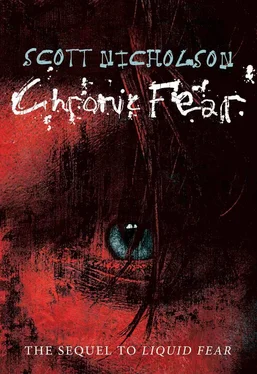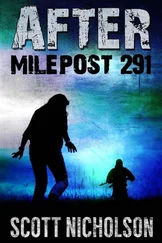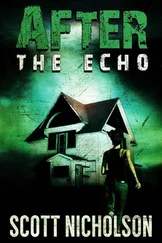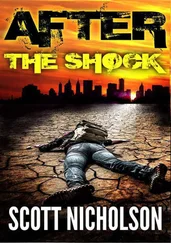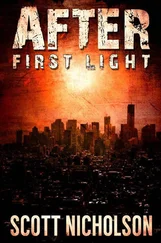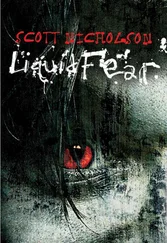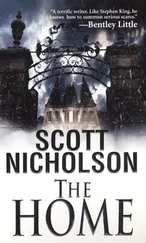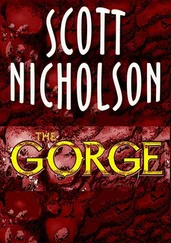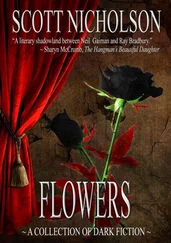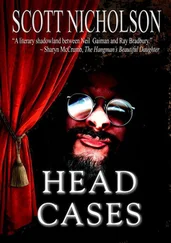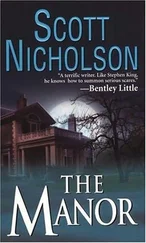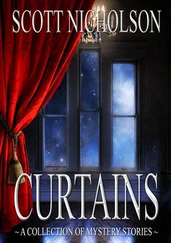Scott Nicholson - Chronic fear
Здесь есть возможность читать онлайн «Scott Nicholson - Chronic fear» весь текст электронной книги совершенно бесплатно (целиком полную версию без сокращений). В некоторых случаях можно слушать аудио, скачать через торрент в формате fb2 и присутствует краткое содержание. Жанр: Триллер, на английском языке. Описание произведения, (предисловие) а так же отзывы посетителей доступны на портале библиотеки ЛибКат.
- Название:Chronic fear
- Автор:
- Жанр:
- Год:неизвестен
- ISBN:нет данных
- Рейтинг книги:3 / 5. Голосов: 1
-
Избранное:Добавить в избранное
- Отзывы:
-
Ваша оценка:
- 60
- 1
- 2
- 3
- 4
- 5
Chronic fear: краткое содержание, описание и аннотация
Предлагаем к чтению аннотацию, описание, краткое содержание или предисловие (зависит от того, что написал сам автор книги «Chronic fear»). Если вы не нашли необходимую информацию о книге — напишите в комментариях, мы постараемся отыскать её.
Chronic fear — читать онлайн бесплатно полную книгу (весь текст) целиком
Ниже представлен текст книги, разбитый по страницам. Система сохранения места последней прочитанной страницы, позволяет с удобством читать онлайн бесплатно книгу «Chronic fear», без необходимости каждый раз заново искать на чём Вы остановились. Поставьте закладку, и сможете в любой момент перейти на страницу, на которой закончили чтение.
Интервал:
Закладка:
And now Wendy had unearthed a compound that half a dozen people had died to control. Wendy had drawn a secret chemical formula.
Wendy had drawn Seethe.
CHAPTER TWENTY-NINE
Scagnelli wasn’t a hacker by profession, but he’d picked up enough skills to penetrate a firewall or two.
Not that he needed many skills. His level of respect for the CIA plummeted another few notches as he dug through the files on the stolen laptop. He’d previously hijacked their e-mails but he expected the case files to be secured. But Dr. Morgan’s stolen collection of brain scans and her surveillance records were all stored on the desktop in plain sight.
Scagnelli initially suspected they were red herrings, because nothing important was ever hidden in plain sight. But he gradually accepted it was yet more incompetence by Goatbreeder and Baby bin Laden, agents with so little professionalism that they didn’t even bother encrypting the files or using passwords.
When will the government learn that American pride can’t be exported?
But something about the whole job still smelled funny.
The CIA had always been the wild card of the intelligence community, an independent agency that made presidents uneasy and kept generals in line. But the reorganization in 2004 punished the agency for the failure of the country’s intelligence networks. The perception since then was that the CIA was more of a fringe watchdog group, useful in spying on everyone but not particularly reliable.
As such, it was the agency most likely to be exploited in a political bait-and-switch.
And from the information in the leather satchel he’d taken from the two dead agents, Senator Burchfield had triggered the investigation into Dr. Alexis Morgan, considering her research a matter of national security. That wasn’t so unusual, since practically everything was a matter of national security these days, from the ingredients of ballpark hot dogs to the newest panelist on American Idol. Burchfield’s primary influence was as chairman of the Senate health committee, but he also served on the defense subcommittee.
If Burchfield was applying pressure, he could have gone through one of the eight intelligence agencies in the Department of Defense. That meant he either didn’t trust his own channels, or he wanted a smokescreen to keep anyone from tracing the footprints back to him.
But Scagnelli was already tracing the footprints straight to Burchfield’s home in the Washington Park neighborhood of Winston-Salem, where million-dollar mansions covered the small rise where once Moravian settlers had hunted.
After returning to Darrell Silver’s lab and finding the place abandoned, he’d called Burchfield and set up the meeting, making sure he could get past the Secret Service agents assigned to the presidential candidate. Scagnelli didn’t mind adding another notch or two to his gun, but leaving blood on Burchfield’s patio would be harder to erase than a couple of bumbling agents dumped in the trunk of a Honda Civic.
Now, as he pulled onto the bricked driveway leading to Burchfield’s house, he mulled a plausible explanation for Forsyth’s disappearance. Most importantly, he didn’t want to be blamed for abandoning the stubborn old bastard. He was exiting his car when the obligatory Secret Service agent made a sudden appearance.
Jesus, these fuckers wear sunglasses even in the dark.
“Are you Scagnelli?” the agent said.
“No, I’m Peter Cottontail, hopping down the bunny trail.”
The agent’s face was stone under the porch light. It was nearly midnight, and he’d probably been on duty all day. The Secret Service wasn’t known for smiles and giggles.
“You fit the description,” the agent said, escorting Scagnelli to the door and even pressing the buzzer for him. “Right down to being a flaming asshole.”
Burchfield was in a burgundy robe, although he wore a white T-shirt and sweatpants beneath it. Eyeglasses with thick plastic frames hung at the end of his nose, and his hair was casually raked to one side of his forehead. He looked like he’d been on duty all day as well, like a clown who’d just taken off his makeup but whose mind hadn’t yet fully left the ring.
“Nothing on Forsyth?” Burchfield asked, not bothering with formalities.
“I tried his cell. No answer.”
“He was meeting the Morgans, correct?”
“Yes, and they were having a little powwow over a drug called Halcyon. And from what I’ve found out, you and the Morgans have a history, too.”
Burchfield bristled at Scagnelli’s forwardness. “Why weren’t you with him?”
Scagnelli held up the leather satchel. “He sent me on another job. So either he thought he could handle things on his own or he didn’t want any witnesses for whatever he had planned.”
Burchfield raised his voice. “I’ve known Wallace since my first Congressional run. And he’s been both a mentor and one of my closest allies. Without his support, I’d still be a party delegate, not the next president of the United States. So if you’re coming here to make accusations-”
Scagnelli gave a vehement wave to placate the senator. The man who looked so confident and handsome on television appeared slightly sunken and pale in real life. He reminded Scagnelli of a sad uncle who used to give him quarters for video games, as if vicarious pleasure was the only kind he could enjoy.
“Let me show you what I’ve found, and you can decide for yourself,” Scagnelli said.
Burchfield tilted his head to invite Scagnelli deeper into the house. Two sets of stairs rose from the foyer, and the ceiling was fifteen feet high on the first floor. The walls were of dark wood, mahogany or some more exotic material that had probably dodged an import tax. An antique table bore a photo of Burchfield and his brainless-looking trophy wife, little wire baskets on each side filled with stinky potpourri.
Burchfield opened a door and ushered Scagnelli into a small office, shelves of books lining two sides. The room smelled of ink and furniture polish. An expensive collection of ceramic figurines lined the mantel of a gas-log hearth, representing notable historical figures such as Benjamin Franklin, Abraham Lincoln, and others that Scagnelli didn’t recognize. They were hand painted and their eyes seemed to track Scagnelli’s movements.
He wasted no time flopping the satchel onto a coffee table and spreading out the documents. In addition to the images of the brain scans, Scagnelli showed Burchfield copies of e-mails, decoded messages, and transcripts of intercepted phone calls. A few of the memos were cryptically coded “per Burchfield directive.”
“I’m afraid you didn’t do a very good job of covering your tracks, sir,” Scagnelli concluded.
Burchfield, whose lips pursed increasingly tighter as Scagnelli presented the information, finally spoke. “None of this is mine,” he said.
“The CIA’s already been busted for running covert programs without telling Congress,” Scagnelli said.
“Of course. That assassination program in the Bush era was a little embarrassing for us all. Alleged assassination program, I mean.”
“This might be a rogue thing,” Scagnelli said. “But if you’re not the one who ordered the investigation into the Morgans, then somebody’s setting you up.”
Scagnelli didn’t tell him about the e-mail messages he’d sent to Roland Doyle, routing them through a dummied-up CIA address. Those didn’t have Burchfield’s fingerprints on them, but an outside observer would probably lump them into the same ball of wax.
“Of course we were monitoring the Morgans, and everyone else connected to Sebastian Briggs,” the senator said. “But it was a closed loop. Halcyon was buried by CRO, who wanted nothing to do with it anymore. And Seethe…”
Читать дальшеИнтервал:
Закладка:
Похожие книги на «Chronic fear»
Представляем Вашему вниманию похожие книги на «Chronic fear» списком для выбора. Мы отобрали схожую по названию и смыслу литературу в надежде предоставить читателям больше вариантов отыскать новые, интересные, ещё непрочитанные произведения.
Обсуждение, отзывы о книге «Chronic fear» и просто собственные мнения читателей. Оставьте ваши комментарии, напишите, что Вы думаете о произведении, его смысле или главных героях. Укажите что конкретно понравилось, а что нет, и почему Вы так считаете.
